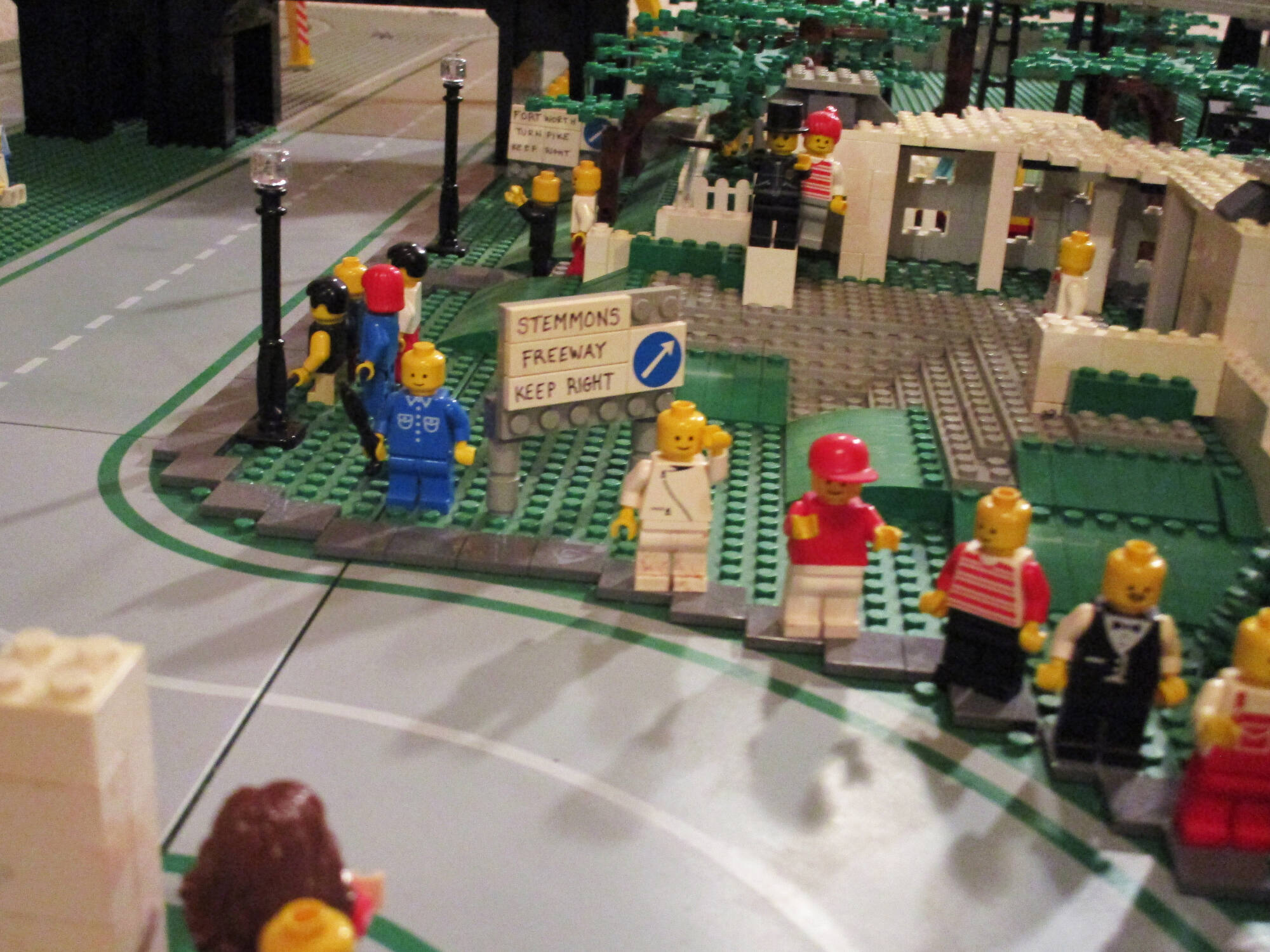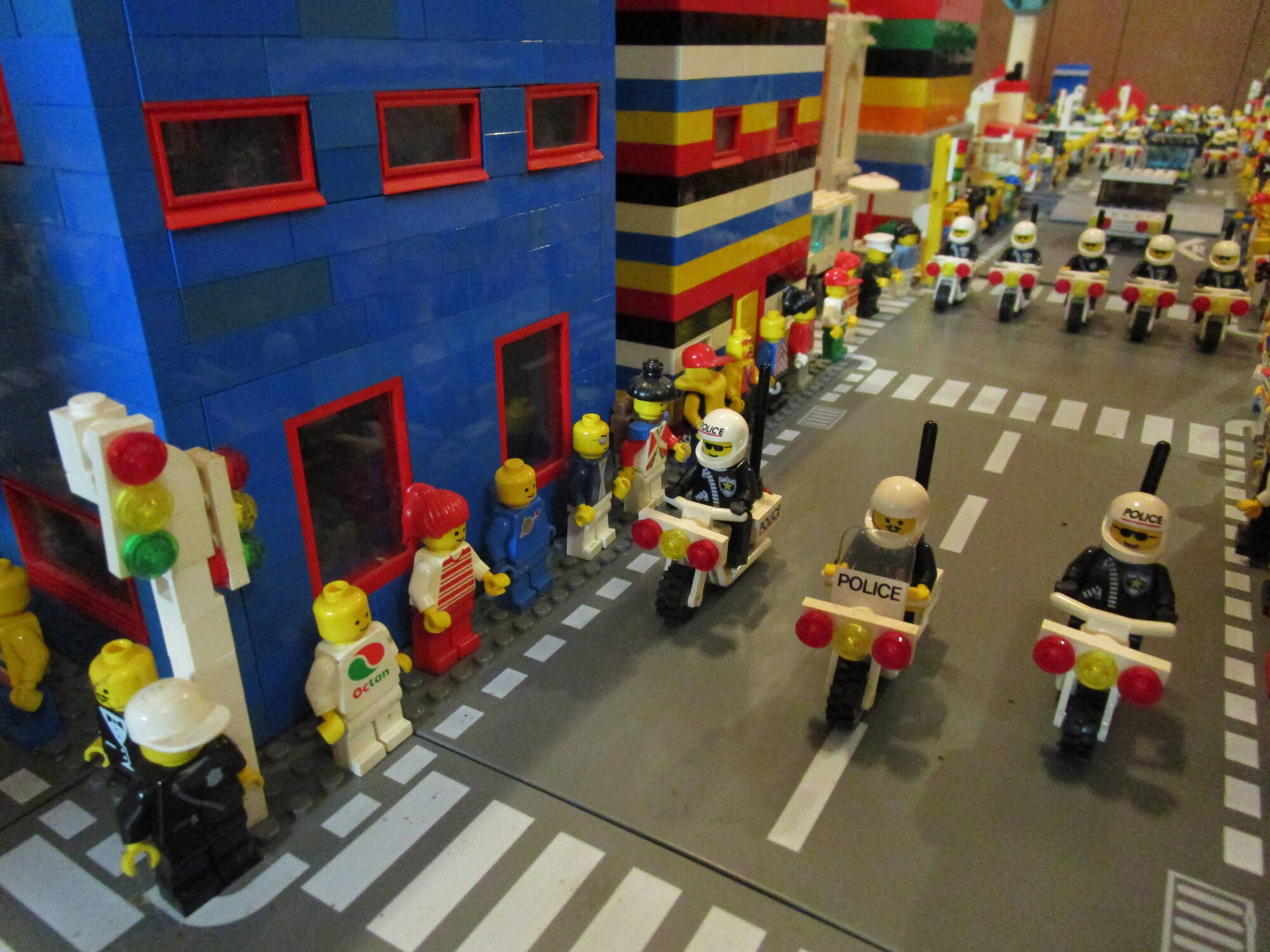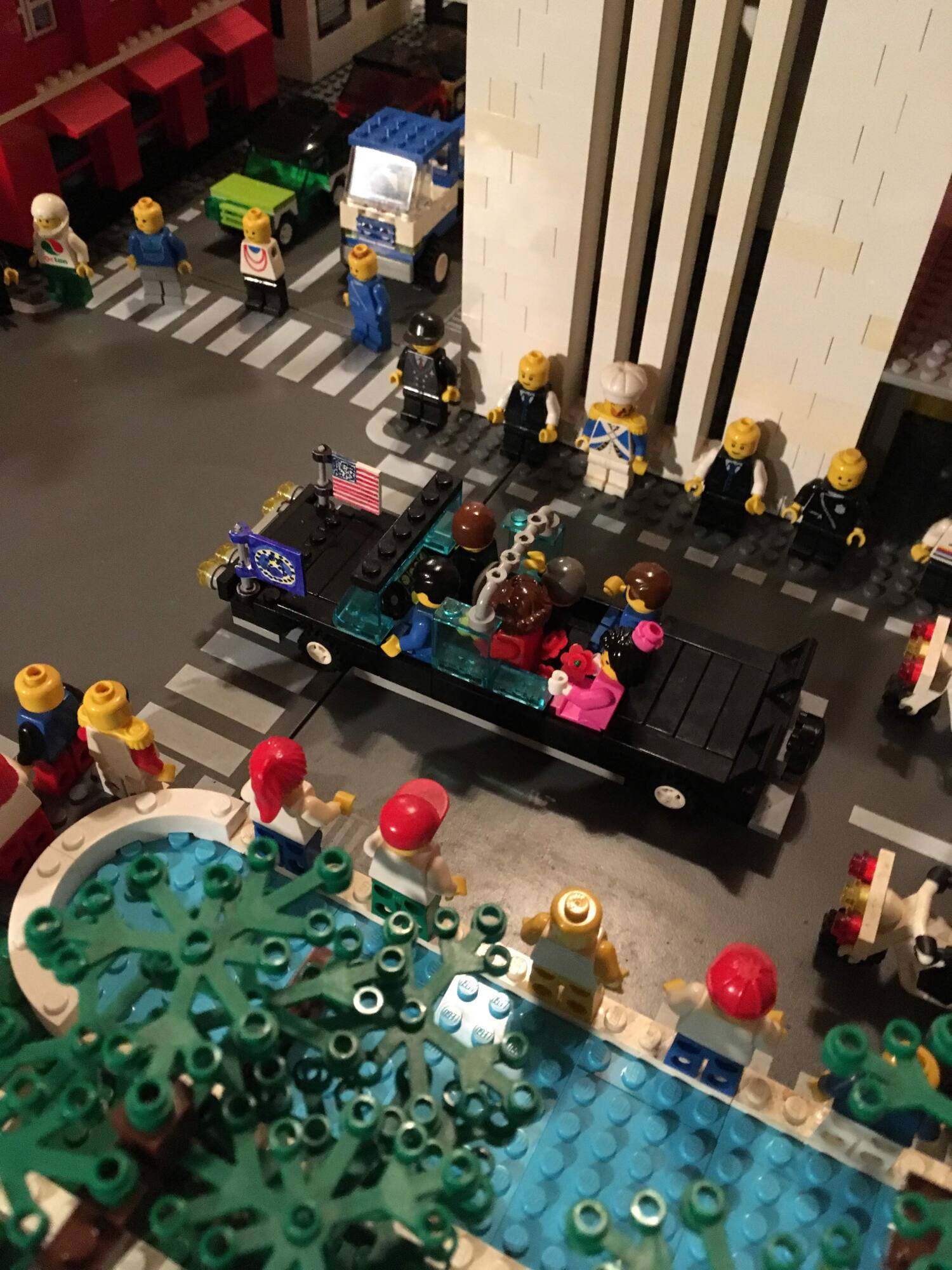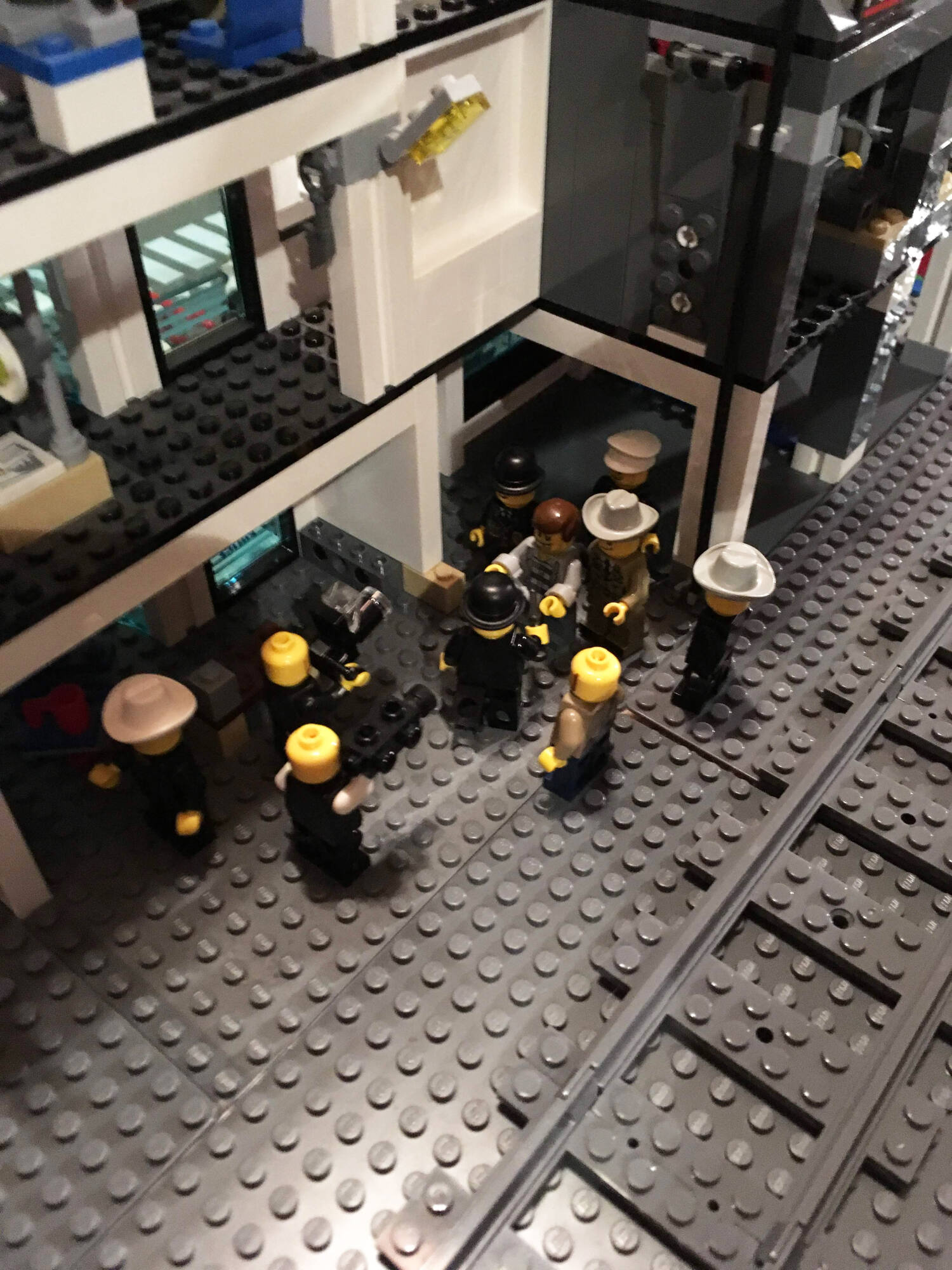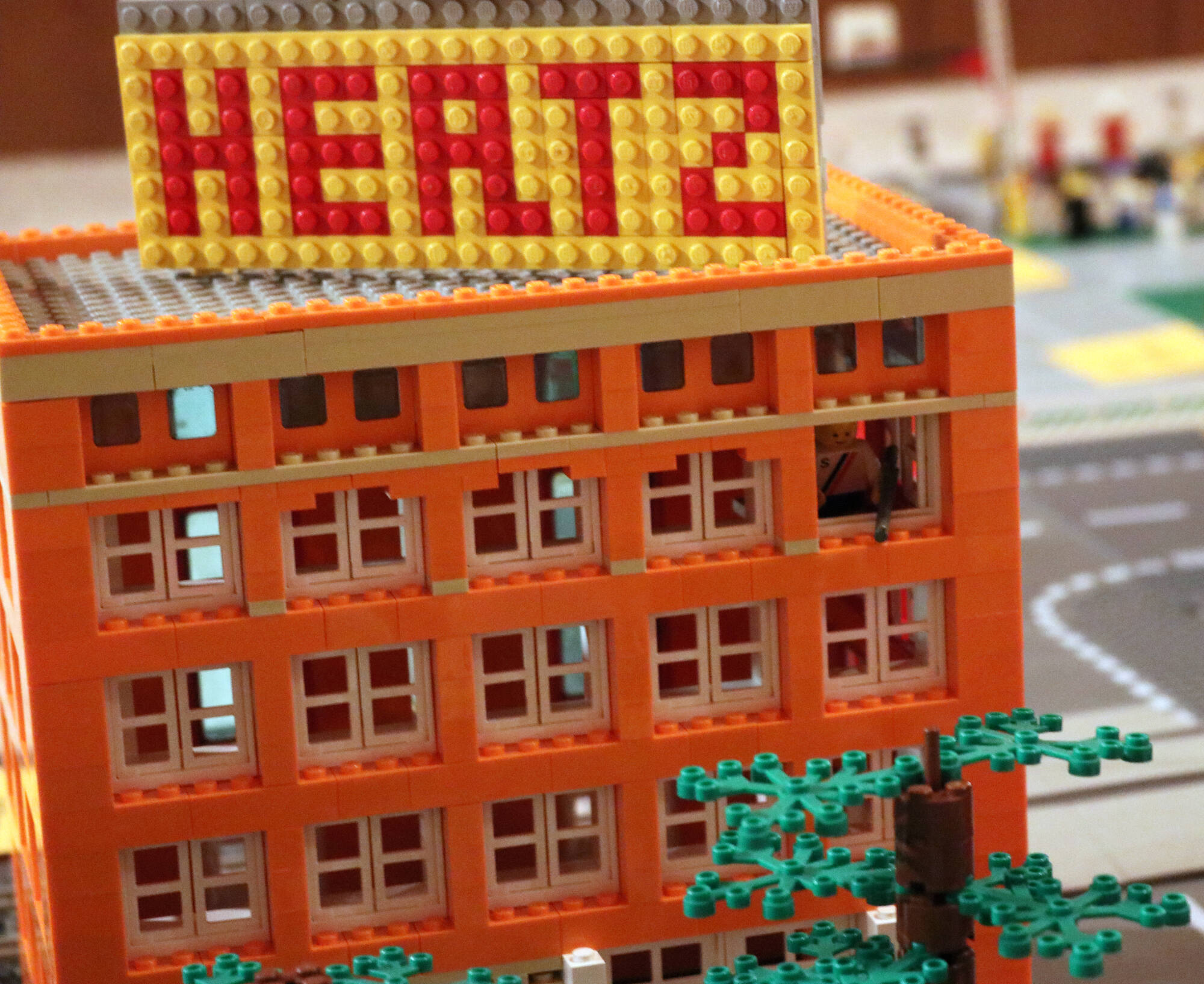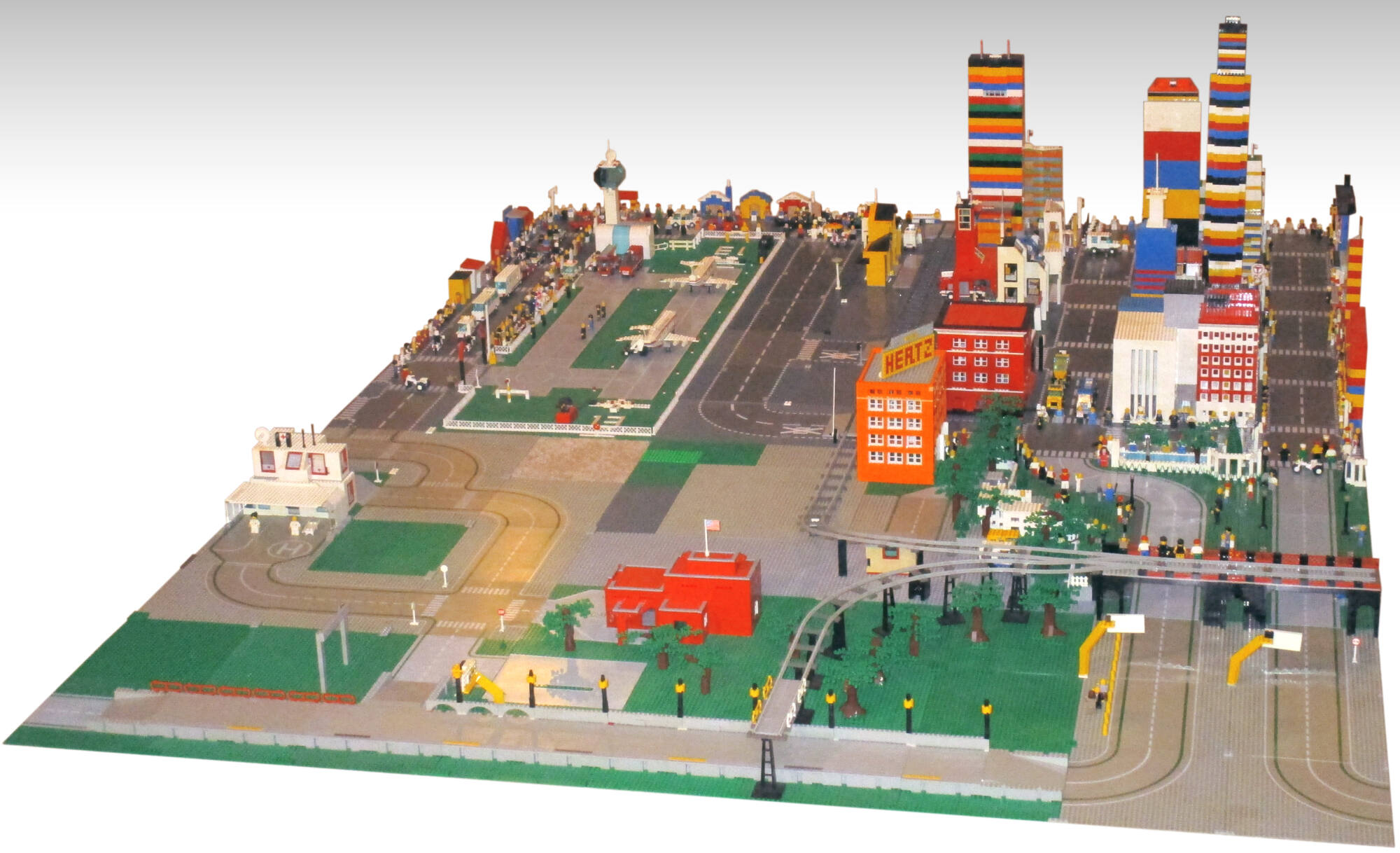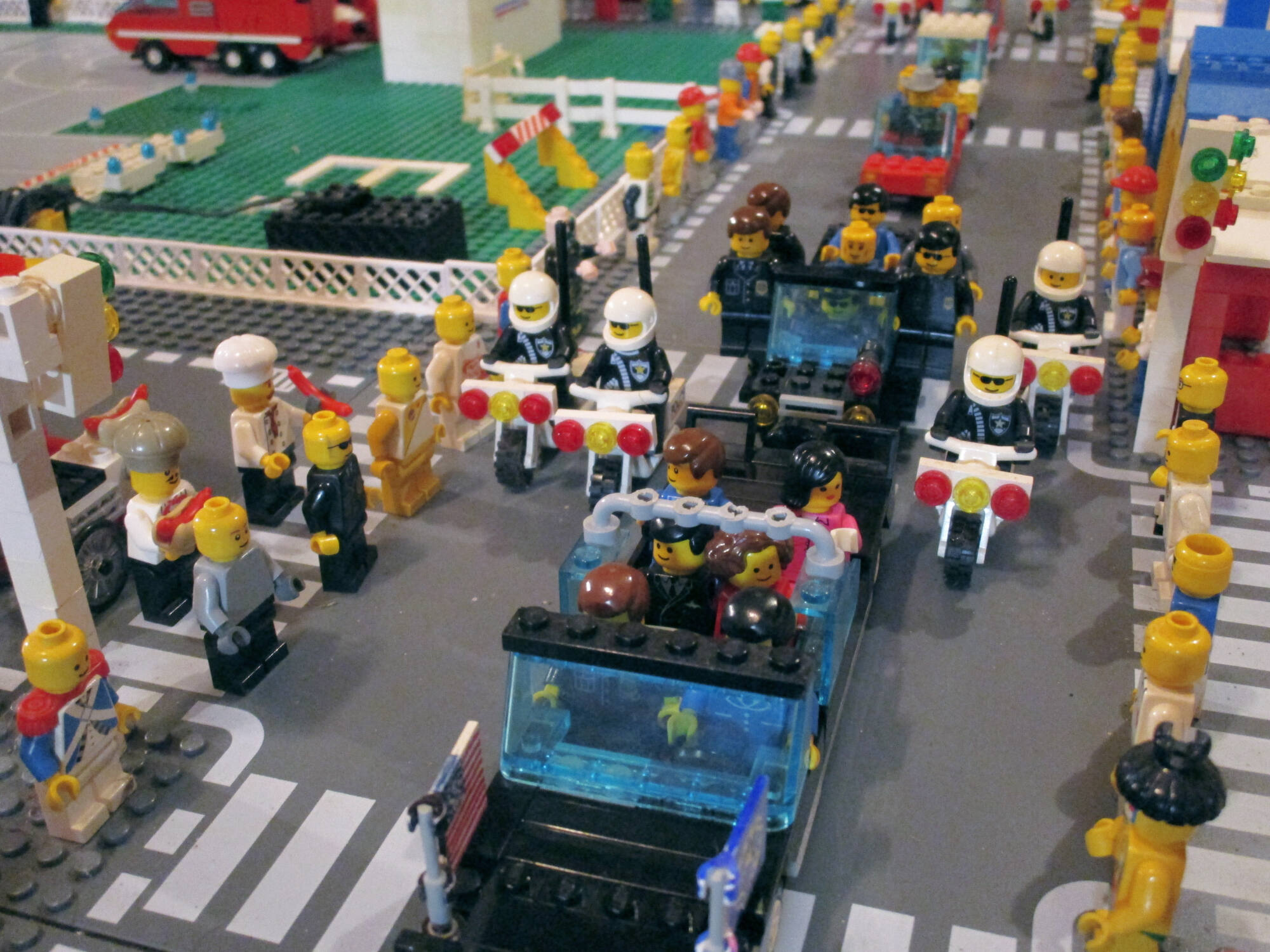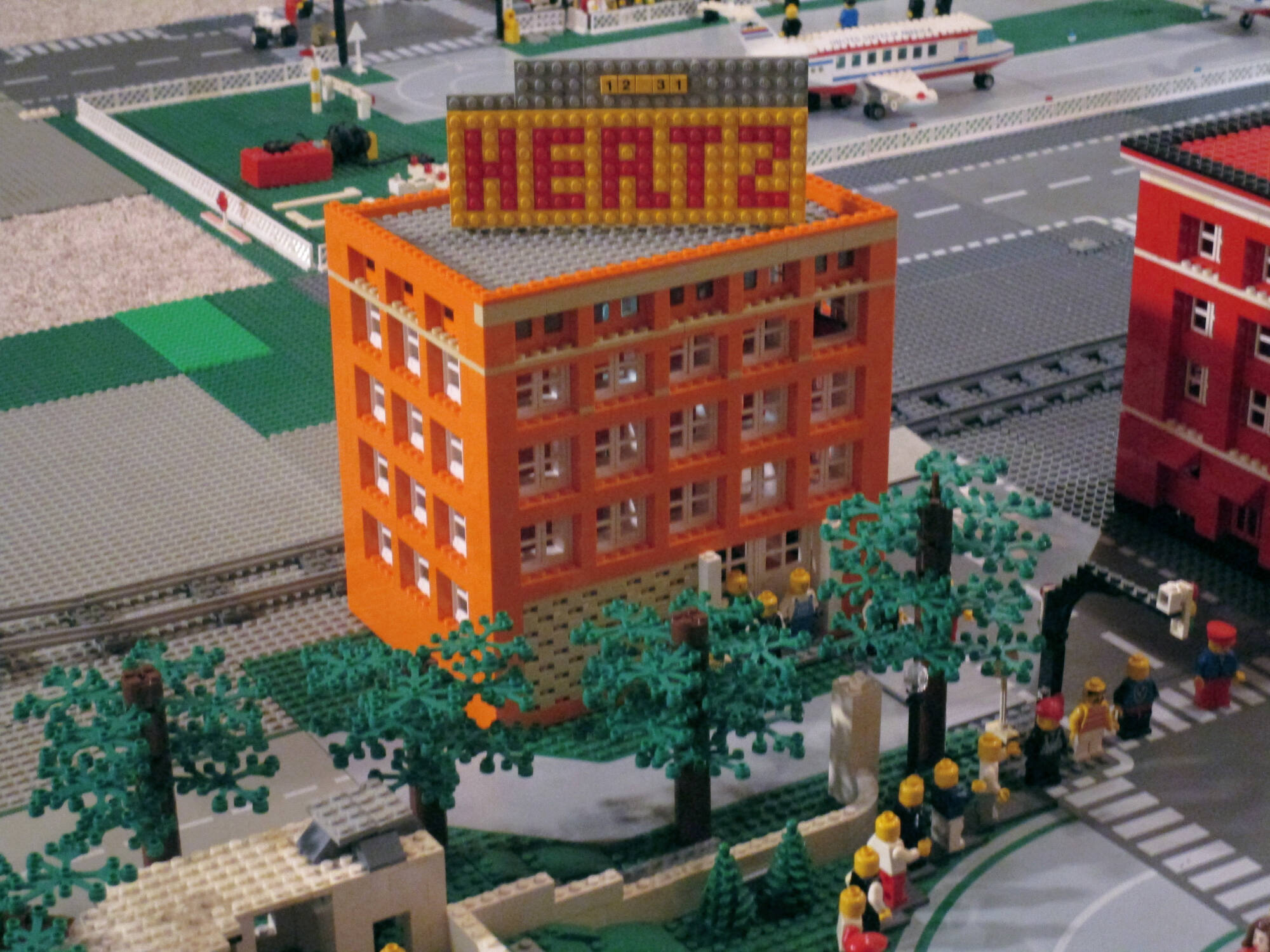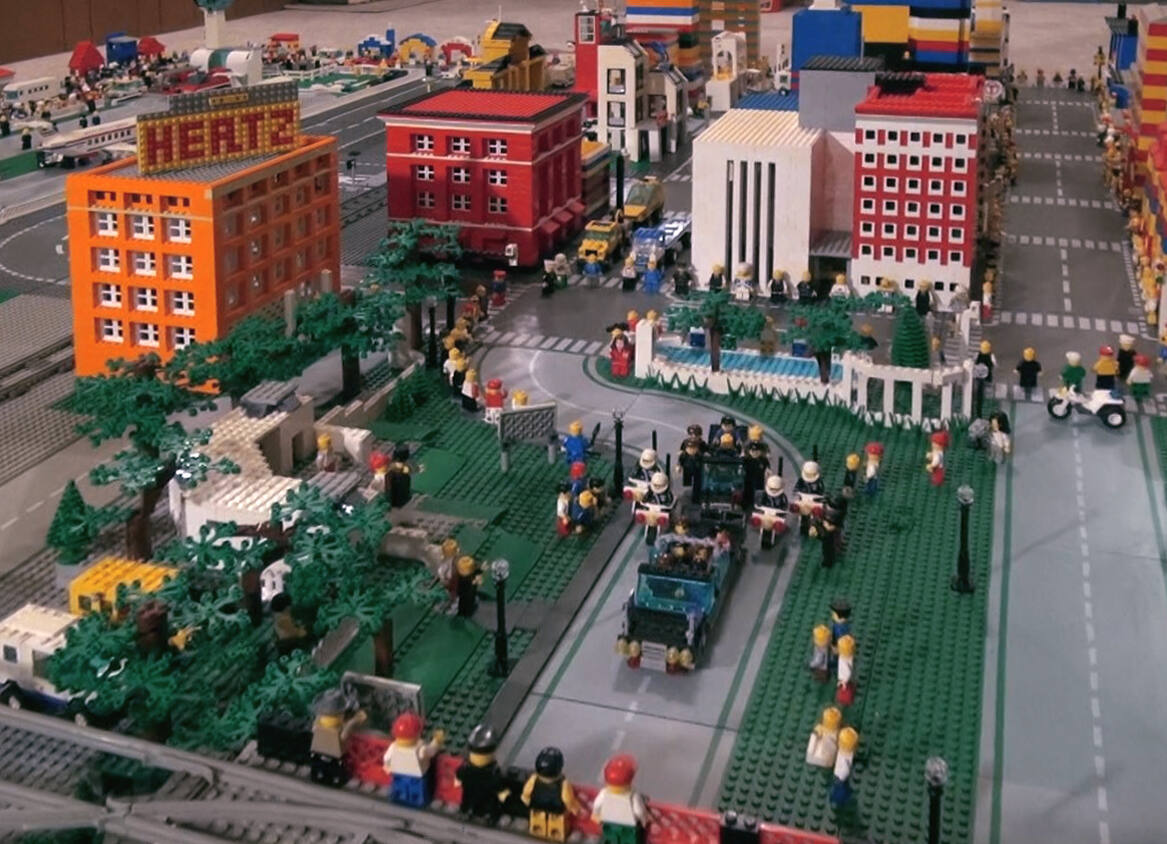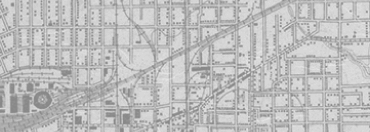


Back
LEGO model of the Kennedy motorcade route
Amateur LEGO model of the Kennedy motorcade route constructed between the early 1990s and 2019. The model measures approximately 7 1/2 feet wide x 11 feet long, with the tallest building reaching approximately 4 feet high. The pieces were repurposed from a number of different LEGO building sets, with some pieces dating back to the 1960s, many of which feature minifigures and buildings designed for other functions. Indiana native Eric Peschke began this building project at approximately age eight and spent close to three decades constructing, expanding and enhancing a detailed model of the Dallas parade route including Love Field, downtown Dallas, Dealey Plaza, Dallas Trade Mart and Parkland Memorial Hospital. The model is populated by thousands of LEGO blocks and minifigures.
LEGO model of the Kennedy motorcade route
1994 - 2019
Plastic
48 × 90 × 132 in. (121.9 × 228.6 × 335.3 cm)
Eric Peschke Collection/The Sixth Floor Museum at Dealey Plaza
2019.055
Indiana native Eric Peschke (b. 1982) became fascinated with the Kennedy assassination in the early 1990s. At the same time, after his uncle gave him vintage LEGO building sets from Germany, according to Eric, he "just kind of fell in love with constructing models." Between ages eight and eleven, Eric began constructing a model of Dealey Plaza, using historic photographs as a guide. From there, he eventually added downtown Dallas and ultimately the entire Kennedy parade route. The model, constructed and stored for decades in the basement of his childhood home, was enhanced over the years as Eric tracked down specific building blocks. For example, as an adult, he completely rebuilt the Texas School Book Depository building, replacing his original red building blocks with newly acquired orange blocks that better matched the actual building. The minifigure representing Jackie Kennedy wore a red outfit for many years until Eric tracked down a rare pink minifigure body that enabled him to dress her more appropriately to match her distinctive pink suit from November 22, 1963. The model project ultimately became a family affair as Eric's daughter constructed additions - such as a hot dog cart - from newer LEGO models, joining some building blocks that dated back to his uncle's original 1960s-era LEGOs purchased in Germany. Eric continued "plussing" his model right up until its donation to the Museum in 2019. Eric has been a longtime supporter of The Sixth Floor Museum since first sharing images of his model with us in 2005. He was among the first "non rememberers" (those born after 1963) to participate in the Museum's Oral History Project. To date, he has recorded three interviews, in 2006, 2007 and 2018. His mother, Leslie Peschke, also recorded an oral history in 2018. Prior to donating the entire model in 2019, Eric even constructed a duplicate Kennedy limousine and Secret Service follow-up vehicle (in addition to the originals found in his model), which he donated to the Museum in 2011. Eric first showed me photos of his impressive model in 2005, but I finally got the opportunity to see it in person thirteen years later during a research visit to Indiana in 2018. I'll never forget walking down the steps into his mother's basement and seeing the entirety of downtown Dallas depicted in brightly colored LEGO blocks. It immediately put all of my meager childhood models, which admittedly did include at least one Kennedy limousine, to shame. We literally spent hours going through every inch of the model, noting remarkable details like miniature U.S. and Confederate flags in the crowd at Dallas Love Field, which appear in a number of historic news photographs from that day, and even a barely visible scene of Jack Ruby shooting Lee Harvey Oswald inside the building that represents Dallas police headquarters and city hall. There are a number of fascinating whimsical details, covered in part in a separate note by our Collections Manager. To say that I was impressed is an understatement. As a longtime historian and enthusiast of popular culture representations of President Kennedy and the assassination, it was an amazing moment to see Eric Peschke's multi-decade building project. Sitting in that basement, it was very easy to imagine an inspired young boy, not too unlike myself, blending historical curiosity with childhood creativity to respond in his own unique way to the Kennedy assassination. -- Stephen Fagin, Curator
There are a number of amazing details in this model. For instance, in the section representing the beginning of the motorcade route at Love Field Airport, you can see minifigures lined up along a fence to greet the arrival of Air Force One. Among the figures in the crowd of spectators is someone holding a Confederate battle flag and a Texas State flag, similar to eyewitness photos from Love Field such as this one by Dorothy Murphy: https://emuseum.jfk.org/objects/22084. Eric Peschke hand-drew and colored these little flags to enhance the historical accuracy of the scene he wanted to depict.Hundreds of minifigures appear in the model, many of which line the streets of the motorcade route as members of a generic crowd. If you look closely, though, you can see minifigures dressed as skeletons, pirates, monsters, British soldiers, and many more. This really represents the creativity and ingenuity of Eric Peschke as a child. He used what he had and combined minifigures from a number of different sets in a truly unique and interesting way to portray a scene that captured his imagination. In later years Peschke took great care to portray the motorcade participants, known assassination eyewitnesses, and the Texas School Book Depository building itself in great detail. He even went so far as to rebuild the Texas School Book Depositoy building, which was originally constructed using red bricks, out of orange bricks to be more authentic. Additionally, in the presidential limo, the minifigure representing Jacqueline Kennedy was originally portrayed wearing a red suit. Peschke decided he wanted her to look more historically accurate and so special ordered a minifigure in a pink suit and hat that would better represent the iconic first lady. There are even some hidden "Easter egg" style details in the model that you might not immediately notice. For instance, amidst the buildings in the dowtown section is a generic police station. At the base of the police station is a scene depicting Jack Ruby shooting Lee Harvey Oswald during what was supposed to be a routine prisoner transfer. While the police station is not located where the Dallas County Jail is in reality, this interesting scene was inspired by real photos of the famous moment, such as this Jack Beers photo: https://emuseum.jfk.org/objects/22823. Peschke goes so far as to identify specific police officers including Detective Jim Leavelle, portrayed as a minifgure handcuffed to Oswald and wearing a tan cowboy hat. The more you look at this amazing model, the more details you find! - Stephanie Allen-Givens, Collections and Exhibits Manager

LEGO model of the Kennedy motorcade route
Amateur LEGO model of the Kennedy motorcade route constructed between the early 1990s and 2019. The model measures approximately 7 1/2 feet wide x 11 feet long, with the tallest building reaching approximately 4 feet high. The pieces were repurposed from a number of different LEGO building sets, with some pieces dating back to the 1960s, many of which feature minifigures and buildings designed for other functions. Indiana native Eric Peschke began this building project at approximately age eight and spent close to three decades constructing, expanding and enhancing a detailed model of the Dallas parade route including Love Field, downtown Dallas, Dealey Plaza, Dallas Trade Mart and Parkland Memorial Hospital. The model is populated by thousands of LEGO blocks and minifigures.
LEGO model of the Kennedy motorcade route
1994 - 2019
Youth
Pop Culture
Toys
Artwork
Student
LEGO Model
Peschke, Eric
LEGO
Crown Point
Plastic
48 × 90 × 132 in. (121.9 × 228.6 × 335.3 cm)
Eric Peschke Collection/The Sixth Floor Museum at Dealey Plaza
2019.055
Indiana native Eric Peschke (b. 1982) became fascinated with the Kennedy assassination in the early 1990s. At the same time, after his uncle gave him vintage LEGO building sets from Germany, according to Eric, he "just kind of fell in love with constructing models." Between ages eight and eleven, Eric began constructing a model of Dealey Plaza, using historic photographs as a guide. From there, he eventually added downtown Dallas and ultimately the entire Kennedy parade route. The model, constructed and stored for decades in the basement of his childhood home, was enhanced over the years as Eric tracked down specific building blocks. For example, as an adult, he completely rebuilt the Texas School Book Depository building, replacing his original red building blocks with newly acquired orange blocks that better matched the actual building. The minifigure representing Jackie Kennedy wore a red outfit for many years until Eric tracked down a rare pink minifigure body that enabled him to dress her more appropriately to match her distinctive pink suit from November 22, 1963. The model project ultimately became a family affair as Eric's daughter constructed additions - such as a hot dog cart - from newer LEGO models, joining some building blocks that dated back to his uncle's original 1960s-era LEGOs purchased in Germany. Eric continued "plussing" his model right up until its donation to the Museum in 2019. Eric has been a longtime supporter of The Sixth Floor Museum since first sharing images of his model with us in 2005. He was among the first "non rememberers" (those born after 1963) to participate in the Museum's Oral History Project. To date, he has recorded three interviews, in 2006, 2007 and 2018. His mother, Leslie Peschke, also recorded an oral history in 2018. Prior to donating the entire model in 2019, Eric even constructed a duplicate Kennedy limousine and Secret Service follow-up vehicle (in addition to the originals found in his model), which he donated to the Museum in 2011. Eric first showed me photos of his impressive model in 2005, but I finally got the opportunity to see it in person thirteen years later during a research visit to Indiana in 2018. I'll never forget walking down the steps into his mother's basement and seeing the entirety of downtown Dallas depicted in brightly colored LEGO blocks. It immediately put all of my meager childhood models, which admittedly did include at least one Kennedy limousine, to shame. We literally spent hours going through every inch of the model, noting remarkable details like miniature U.S. and Confederate flags in the crowd at Dallas Love Field, which appear in a number of historic news photographs from that day, and even a barely visible scene of Jack Ruby shooting Lee Harvey Oswald inside the building that represents Dallas police headquarters and city hall. There are a number of fascinating whimsical details, covered in part in a separate note by our Collections Manager. To say that I was impressed is an understatement. As a longtime historian and enthusiast of popular culture representations of President Kennedy and the assassination, it was an amazing moment to see Eric Peschke's multi-decade building project. Sitting in that basement, it was very easy to imagine an inspired young boy, not too unlike myself, blending historical curiosity with childhood creativity to respond in his own unique way to the Kennedy assassination. -- Stephen Fagin, Curator
There are a number of amazing details in this model. For instance, in the section representing the beginning of the motorcade route at Love Field Airport, you can see minifigures lined up along a fence to greet the arrival of Air Force One. Among the figures in the crowd of spectators is someone holding a Confederate battle flag and a Texas State flag, similar to eyewitness photos from Love Field such as this one by Dorothy Murphy: https://emuseum.jfk.org/objects/22084. Eric Peschke hand-drew and colored these little flags to enhance the historical accuracy of the scene he wanted to depict.Hundreds of minifigures appear in the model, many of which line the streets of the motorcade route as members of a generic crowd. If you look closely, though, you can see minifigures dressed as skeletons, pirates, monsters, British soldiers, and many more. This really represents the creativity and ingenuity of Eric Peschke as a child. He used what he had and combined minifigures from a number of different sets in a truly unique and interesting way to portray a scene that captured his imagination. In later years Peschke took great care to portray the motorcade participants, known assassination eyewitnesses, and the Texas School Book Depository building itself in great detail. He even went so far as to rebuild the Texas School Book Depositoy building, which was originally constructed using red bricks, out of orange bricks to be more authentic. Additionally, in the presidential limo, the minifigure representing Jacqueline Kennedy was originally portrayed wearing a red suit. Peschke decided he wanted her to look more historically accurate and so special ordered a minifigure in a pink suit and hat that would better represent the iconic first lady. There are even some hidden "Easter egg" style details in the model that you might not immediately notice. For instance, amidst the buildings in the dowtown section is a generic police station. At the base of the police station is a scene depicting Jack Ruby shooting Lee Harvey Oswald during what was supposed to be a routine prisoner transfer. While the police station is not located where the Dallas County Jail is in reality, this interesting scene was inspired by real photos of the famous moment, such as this Jack Beers photo: https://emuseum.jfk.org/objects/22823. Peschke goes so far as to identify specific police officers including Detective Jim Leavelle, portrayed as a minifgure handcuffed to Oswald and wearing a tan cowboy hat. The more you look at this amazing model, the more details you find! - Stephanie Allen-Givens, Collections and Exhibits Manager


